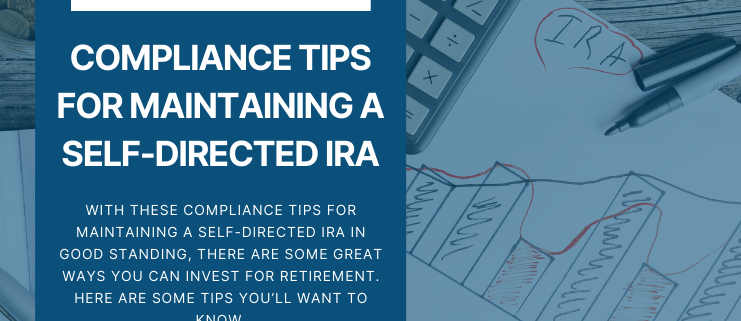Compliance Tips for Maintaining a Self-Directed IRA
A Self-Directed IRA is like a gateway to another dimension of investing. You can hold gold. You can hold real estate. You can hold private notes and even tax liens. It’s not what everyone’s used to—and for some investors, that’s a bit scary. They don’t want to run afoul of any investing rules, which makes sense. Fortunately, you don’t have to. With these compliance tips for maintaining a Self-Directed IRA in good standing, there are some great ways you can invest for retirement. And you can do it without having to worry about exorbitant fees because you broke the rules. Here are some tips you’ll want to know.
Tip #1: Avoid Self-Dealing by Not Using Your IRA to Benefit Yourself or Your Immediate Family Directly
Self-dealing is a major no-no with Self-Directed IRAs, and probably your most basic rule of thumb. Self-dealing refers to using your IRA for your own benefit, which includes immediate family too. You can’t buy a vacation home and stay there or loan money to your business. The IRS strictly prohibits this, which is why violation can lead to heavy penalties and the disqualification of your IRA. Always ensure your investments benefit only the IRA to stay compliant and protect your retirement savings.
Tip #2: Ensure All Transactions Are at Arm’s Length to Avoid Conflicts of Interest
Arm’s length transactions are crucial for maintaining the integrity of your IRA. They ensure impartiality and prevent conflicts of interest. You can’t deal with related parties such as family members or business associates. Always transact with third parties to keep everything above board. This keeps your IRA in good standing. Perhaps even better? It also ensures fairness and transparency in all your investments.
Tip #3: Do Not Use IRA Funds to Purchase Property for Personal Use or Enjoyment
Your IRA is for retirement savings, not personal enjoyment. You can’t use it to buy a home for yourself or even a vacation spot. The property must be strictly for investment purposes. Any personal use is a breach of IRS rules, leading to severe consequences and potential disqualification of your IRA. I
Bottom line? Keep personal and IRA investments separate to maintain compliance and safeguard your retirement funds.
Tip #4: Maintain Proper Documentation for All IRA Transactions to Ensure Transparency and Compliance
Documentation is your best friend when it comes to compliance. Keep detailed records of every transaction, including purchase agreements, contracts, and receipts. Proper documentation ensures transparency and helps in case of an IRS audit.
Good records not only keep your IRA compliant but also make managing your investments easier. Most importantly, consistent record-keeping is a small effort that can save you from significant issues down the line. (Note: if you work with a highly qualified Self-Directed IRA administration firm like American IRA, you can handle much of this without very difficult work. In fact, American IRA can help maintain paperwork to help keep your account in good standing.)
Tip #5: Do Not Purchase Life Insurance or Collectibles with Your IRA Funds
Certain investments are off-limits for Self-Directed IRAs. Life insurance and collectibles, such as art or antiques, top that list. These are not allowed in Self-Directed IRAs and investing in them can result in penalties. Stick to permissible investments like real estate, precious metals, and private loans. This keeps your IRA in line with IRS regulations and secures your retirement savings for the future. Avoiding prohibited assets ensures your investments remain compliant and beneficial.
Interested in learning more about Self-Directed IRAs? Contact American IRA, LLC at 866-7500-IRA (472) for a free consultation. Download our free guides or visit us online at www.AmericanIRA.com.






